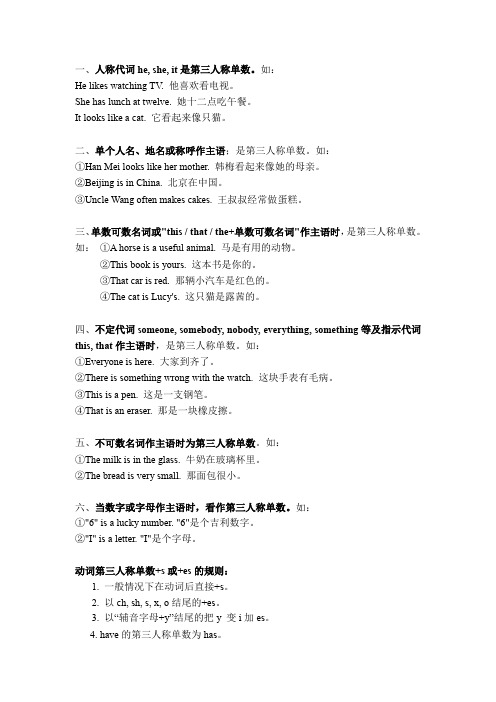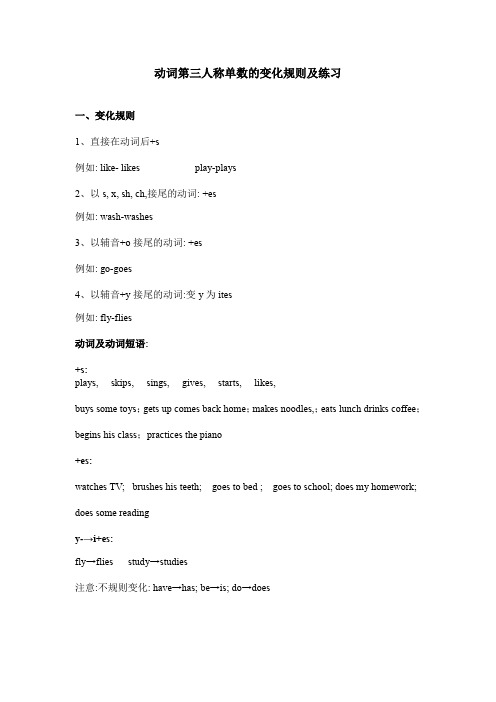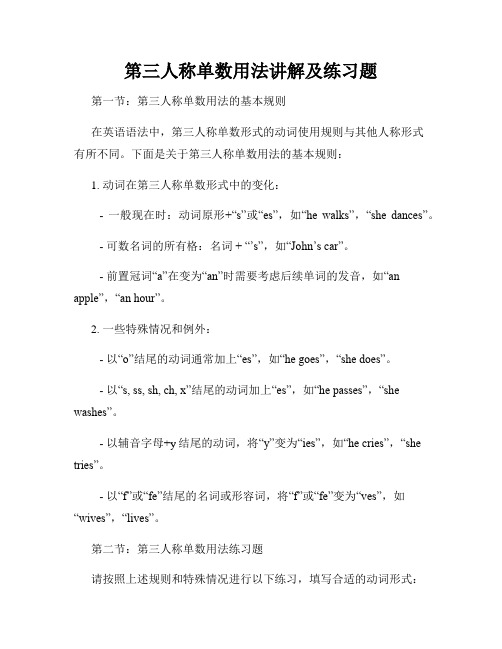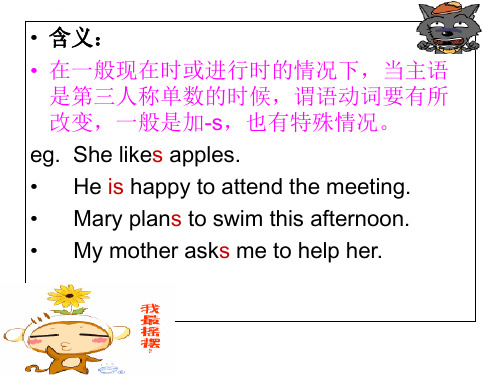第三人称单数用法讲解及练习题
(完整版)第三人称单数讲义及练习

第三人称单数讲义及练习题在一般现在时中,当主语是第三人称单数时,谓语动词要用第三人称单数形式,即常在动词原形后加-s或-es。
现归纳总结如下:一、人称代词he, she, it是第三人称单数。
如:① He likes watching TV. 他喜欢看电视。
②She has lunch at twelve. 她十二点吃午餐。
③It looks like a cat. 它看起来像只猫。
二、单个人名、地名或称呼作主语;是第三人称单数。
如:①Han Mei looks like her mother. 韩梅看起来像她的母亲。
②Beijing is in China. 北京在中国。
③Uncle Wang often makes cakes. 王叔叔经常做蛋糕。
三、单数可数名词或"this / that / the+单数可数名词"作主语时,是第三人称单数。
如:①A horse is a useful animal. 马是有用的动物。
②This book is yours. 这本书是你的。
③That car is red. 那辆小汽车是红色的。
④The cat is Lucy's. 这只猫是露茜的。
四、不定代词someone, somebody, nobody, everything, something等及指示代词this, that作主语时,是第三人称单数。
如:①Everyone is here. 大家到齐了。
②There is something wrong with the watch. 这块手表有毛病。
③This is a pen. 这是一支钢笔。
④That is an eraser. 那是一块橡皮擦。
五、不可数名词作主语时为第三人称单数。
如:①The milk is in the glass. 牛奶在玻璃杯里。
②The bread is very small. 那面包很小。
第三人称单数 讲解及练习

一、人称代词he, she, it是第三人称单数。
如:He likes watching TV. 他喜欢看电视。
She has lunch at twelve. 她十二点吃午餐。
It looks like a cat. 它看起来像只猫。
二、单个人名、地名或称呼作主语;是第三人称单数。
如:①Han Mei looks like her mother. 韩梅看起来像她的母亲。
②Beijing is in China. 北京在中国。
③Uncle Wang often makes cakes. 王叔叔经常做蛋糕。
三、单数可数名词或"this / that / the+单数可数名词"作主语时,是第三人称单数。
如:①A horse is a useful animal. 马是有用的动物。
②This book is yours. 这本书是你的。
③That car is red. 那辆小汽车是红色的。
④The cat is Lucy's. 这只猫是露茜的。
四、不定代词someone, somebody, nobody, everything, something等及指示代词this, that作主语时,是第三人称单数。
如:①Everyone is here. 大家到齐了。
②There is something wrong with the watch. 这块手表有毛病。
③This is a pen. 这是一支钢笔。
④That is an eraser. 那是一块橡皮擦。
五、不可数名词作主语时为第三人称单数。
如:①The milk is in the glass. 牛奶在玻璃杯里。
②The bread is very small. 那面包很小。
六、当数字或字母作主语时,看作第三人称单数。
如:①"6" is a lucky number. "6"是个吉利数字。
完整版)小学动词第三人称单数讲解及练习

完整版)小学动词第三人称单数讲解及练习一般现在时是指在现在发生的动作或状态。
它有三个基本用法:1.描述事物或人的特征和状态,例如“天空是蓝色的”。
2.表示经常性或惯性的动作,例如“我每天六点起床”。
3.描述客观现实,例如“地球绕着太阳转”。
在一般现在时中,当主语是第三人称单数时,谓语动词要用第三人称单数形式,即常在动词原形后加-s或-es。
常见的时间状语有always,every week (day。
year。
month…),once a week,every…,sometimes,at…,on Sunday,usually,often,never,hardly等。
主语可以是人称代词he。
she。
it,单个人名、地名或称呼,单数可数名词或“this / that / the+单数可数名词”,以及不定代词someone。
somebody。
nobody。
everything。
something等及指示代词this。
that。
例如,“他喜欢看电视”、“XXX看起来像她的母亲”、“马是有用的动物”、“这本书是你的”、“这只猫是XXX的”、“大家到齐了”、“这块手表有毛病”、“这是一支钢笔”。
④This is an eraser.XXX is used as the subject。
it takes the third person singular form。
For example:①The milk is in the glass.②The bread is very small.When a number or letter is used as the subject。
it is treated as third person XXX:①"6" XXX.②"I" XXX.The rule for adding -s or -es to verbs in the third person singular form is as follows:1.In general。
第三人称单数讲解及练习

大家都知道,在一般现在时中,当主语是第三人称单数
时,谓语动词要用第三人称单数形式,即常在动词原形 后加-s或-es。但有些同学们对于哪些主语是第三人称 单数还不十分清楚,现归纳总结如下:
一、人称代词he, she, it是第三人称单数。如: He likes watching TV. 他喜欢看电视。 She has lunch at twelve. 她十二点吃午餐。 It looks like a cat. 它看起来像只猫。
动词单三的练习 一. 根据括号里单词的适当形式填空 1. She _____ (be ) a writer. 2. It _(look) like a monkey. 3. We_____(go) to the park. 4. He _____(go) to school. 5. Amy_____(like) eating fruits. 6. Hebei_____(be) next to Shandong. 7. Our teacher _____(be) talking with John. 8. Whose book _____(be) this ? 9. Dogs _____(be) our friends . 10. That blackboard _____(be) clean.
第三人称单数形式的构成
1.一般直接在词尾加 s, 如:want-wants likelikes read-reads play-plays eat-eats 2.以s,x,ch ,sh等结尾的单词加 es , 如: watchwatches teach-teaches miss-misses fix-fixes 4.以辅音字母加o结尾的单词,加 es 如: gogoes do-does 3.以辅音字母加y结尾的单词,变y为i加 es , 如: fly-flies 附加:have--has
动词第三人称单数的变化规则及练习

动词第三人称单数的变化规则及练习一、变化规则1、直接在动词后+s例如:like- likes play-plays2、以s,x,sh,ch,接尾的动词:+es例如:wash-washes3、以辅音+o接尾的动词:+es例如:go-goes4、以辅音+y接尾的动词:变y为ites例如:fly-flies动词及动词短语:+s:plays,skips, sings,gives,starts,likes,buys some toys;gets up comes back home;makes noodles,;eats lunch drinks coffee;begins his class;practices the piano+es:watches TV; brushes his teeth; goes to bed ; goes to school; does my homework; does some readingy-→i+es:fly→flies study→studies注意:不规则变化:have→has; be→is; do→does一、写出下列动词的第三人称单数drink go stay makelook have pass carrycome watch plant fly二、请看下面两组句子,注意区分他们的共同点和不同点。
I go to school every day.I don't go to school every day.He goes to school every day.He doesn't go to school every day.Do you go to school every day?Yes,I do.(No,I don't)Does he go to school every day?Yes,he does.(No,he doesn't)注:1)第三人称单数用了does后面就不用动词的S形式了.而用动词原形。
动词第三人称单数的变化规则讲解及习题练习(附答案)

动词第三人称单数的变化规则讲解及习题练习(附答案)1. 大部分单词可以直接在动词后: +s例:like -- like splay -- play swork--work sread--read swrite--write s发音规则:所加的“s”在清辅音后,发【s】,works在浊辅音及元音后,发【z】,plays在d 后与s 一起发【dz】,reads在t 后与s 一起发【ts】,writes2. 以s, x, sh, ch, 结尾的动词: +es例:watch -- watch esbrush-- brush eswash--wash es发音规则:词尾加的“es”,发【iz】3. 以辅音+o 结尾的动词: +es例:go -- go esdo -- do es发音规则:词尾加的“es”,发【z】,does4. 以辅音+y 结尾的动词: 变y 为i+es例:fly -- fl iesstudy -- stud iescarry--carr ies发音规则:词尾加的“es”,发【iz】,carries5. 不规则变化:例:have -- hasbe 动词的单三形式是:is练习题1. 写出下列动词第三人称单数。
drink ________ go _______stay ________ make _______look ________have_______pass_______ carry ________come_______ watch______plan_______ fly ________study_______ brush________do_________ teach_______2. 用所给单词的适当形式填空。
(1) He ______ (go) to school by bus every morning.(2) Jim _______ (have) many toys.(3) Lucy ______ (study) very hard.She ______ (be) never late for school.(4) Ken _______ (like) his father very much.答案:1.drinks goes stays makes looks has passes carries comes watches plans flies studies brushes does teaches2. (1) goes (2) has (3) studies is (4) likes。
第三人称单数用法讲解及练习题

第三人称单数用法讲解及练习题第一节:第三人称单数用法的基本规则在英语语法中,第三人称单数形式的动词使用规则与其他人称形式有所不同。
下面是关于第三人称单数用法的基本规则:1. 动词在第三人称单数形式中的变化:- 一般现在时:动词原形+“s”或“es”,如“he walks”,“she dances”。
- 可数名词的所有格:名词+ “’s”,如“John’s car”。
- 前置冠词“a”在变为“an”时需要考虑后续单词的发音,如“an apple”,“an hour”。
2. 一些特殊情况和例外:- 以“o”结尾的动词通常加上“es”,如“he goes”,“she does”。
- 以“s, ss, sh, ch, x”结尾的动词加上“es”,如“he passes”,“she washes”。
- 以辅音字母+y结尾的动词,将“y”变为“ies”,如“he cries”,“she tries”。
- 以“f”或“fe”结尾的名词或形容词,将“f”或“fe”变为“ves”,如“wives”,“lives”。
第二节:第三人称单数用法练习题请按照上述规则和特殊情况进行以下练习,填写合适的动词形式:1. Mary _________ (watch) TV every evening.2. The cat _________ (jump) onto the table.3. David often _________ (play) basketball after school.4. The sun _________ (shine) brightly in the sky.5. My sister _________ (study) English at university.6. He _________ (fix) his car yesterday.7. The book _________ (belong) to Sarah.8. The dog _________ (bark) at the mailman.9. The teacher _________ (teach) math in the morning.10. The children _________ (have) fun at the park.答案:1. watches2. jumps3. plays4. shines5. studies6. fixed7. belongs8. barks9. teaches10. have第三节:总结和进一步练习通过上述练习可以看出,第三人称单数动词形式的使用需要注意变化规则和特殊情况。
第三人称单数超详细带练习题ppt课件

1. 一般现在时或是现在进行时 eg. He is playing basketball now. she walks after supper everyday.
2. 主语为第三人称单数,单数名词当主语时 eg. She, he, it, Lucy, Kate, Li Ming.
篮球比赛是根据运动队在规定的比赛 时间里 得分多 少来决 定胜负 的,因 此,篮 球比赛 的计时 计分系 统是一 种得分 类型的 系统
到底什么在什么情况下要把动词变成单三呢?
篮球比赛是根据运动队在规定的比赛 时间里 得分多 少来决 定胜负 的,因 此,篮 球比赛 的计时 计分系 统是一 种得分 类型的 系统
篮球比赛是根据运动队在规定的比赛 时间里 得分多 少来决 定胜负 的,因 此,篮 球比赛 的计时 计分系 统是一 种得分 类型的 系统
人称代词
I We you you he she it they me us you you him her it them
篮球比赛是根据运动队在规定的比赛 时间里 得分多 少来决 定胜负 的,因 此,篮 球比赛 的计时 计分系 统是一 种得分 类型的 系统
七. 当数字或字母作主语时,看作第三人称单数。
"6"
a lucky number.
"6"是个吉利数字。
篮球比赛是根据运动队在规定的比赛 时间里 得分多 少来决 定胜负 的,因 此,篮 球比赛 的计时 计分系 统是一 种得分 类型的 系统
"I"
a letter.
"I"是个字母.
篮球比赛是根据运动队在规定的比赛 时间里 得分多 少来决 定胜负 的,因 此,篮 球比赛 的计时 计分系 统是一 种得分 类型的 系统
- 1、下载文档前请自行甄别文档内容的完整性,平台不提供额外的编辑、内容补充、找答案等附加服务。
- 2、"仅部分预览"的文档,不可在线预览部分如存在完整性等问题,可反馈申请退款(可完整预览的文档不适用该条件!)。
- 3、如文档侵犯您的权益,请联系客服反馈,我们会尽快为您处理(人工客服工作时间:9:00-18:30)。
动词第三人称单数形式讲解
一、什么是第三人称单数
人称可分为三类:第一人称、第二人称和第三人称
第一人称:I we
第二人称:you
第三人称:he、she、it、they和人名类(如:Peter、Jane、my father等)结合以上知识,第三人称单数就是he、she、it和单个的某人,也包括单个的动物、东西等。
二、动词为什么要变成相应的三单形式
在一般现在时中,跟在第三人称单数后面的动词也要变成相应的三单形式,例如:
I watch TV every day. 如果主语是三单,动词要变化:
]
He watches TV every day.
She watches TV every day.
Jane watches TV every day.
三、动词三单的变化规则
1、一般情况下直接加s,如speak-speaks, like-likes, play-plays
2、以s, x, sh, ch, o 结尾的加es,如wash-washes, go-goes, do-does, watch-watches
3、以辅音字母+y 结尾的,改y 为i 再加es,如study-studies,try-tries
4、特殊变化,如have-has
四、does和doesn’t 在句子中的用法
否定句:主语+don’t/doesn’t+动词原形+(其他)。
如:
《
I don’t watch TV. 我不看电视。
当主语为第三人称单数时,要用doesn’t 构成否定句。
如:
He doesn’t watch TV. 他不看电视。
注意doesn’t后面用动词原形watch,而不是watches
一般疑问句:Do / Does+主语+动词原形+(其他)。
如:
Do you watch TV Yes, I do. / No, I don’t.
当主语为第三人称单数时,要用does 构成一般疑问句。
如:Does she watch TV Yes, she does. / No, she doesn’t.
特殊疑问句:疑问词+一般疑问句。
如:
How do you go to school By bike.
、
How does Jane go to school By bus.
五、动词第三人称单数形式的练习
A、写出下列动词的第三人称单数。
drink ________ go _______ stay ________ make ________ have_______ pass_______ carry come________ plant_______ fly ________ study_______ brush________ look _________ teach_______ watch______
B、用括号内动词的适当形式填空。
often ________(have) dinner at home.
_______ (not watch) TV on Monday.
\
_______ (not go) to the zoo on Sunday.
they ________(like) the World Cup
your parents _______(read) newspapers every day
girl _______(teach) us English on Sundays.
and I ________(take) a walk together every evening.
_______(like) cooking.
_______(have) the same hobby.
aunt _______(look) after her baby carefully.
always _______(do) your homework well.
_______(go) to school from Monday to Friday.
)
Tao _______(do) not like PE.
child often _______(watch) TV in the evening.
Hai and Su Yang _______(have) eight lessons this term.
16. Mike’s sister ________ (cook) nice food. I _______ (like) eating it very much.
(do) your father_______ (watch) TV in the evening
No, he_______ (not).
usually_______ (play) football after school
19. He _______ (live) in a small town near Nanjing.
______ (go ) to school by bus, and he ______(go) to school by bike.
C、选出正确的答案:
…
1. She (like / likes) to play football.
2. He (like / likes) drinking milk.
3. I (like / likes) to watch TV.
4. We (like / likes) to play badminton.
5. They (like / likes) to sing songs.
6. She (read / reads) books every day.
7. He (play / plays) computer games every day.
8. It (listen / listens) to the radio every day.
9. Linda (draw / draws) pictures every day.
10. Jane and Linda (play / plays) football every day.
D、把下列句子变为否定句:
1. She draws pictures every day.
2. We like playing football.
;
3 Linda swims every day.
4 They like playing games.
5. My father reads newspaper in the evening.
6. He likes drawing pictures . __________________________________ __________________________
E、把下列句子变为疑问句,并做肯定回答。
1. My father can ride a horse.
2. she does her homework at home
3. Miss Green likes dancing very much.
4. we clean the classroom.
__________________________________ _________________________ 5. My mother cooks the meals. 6. I clean the bedroom everyday.
____________________________ _______________________________
read books in the classroom. 8. The children sing in the music room.。
